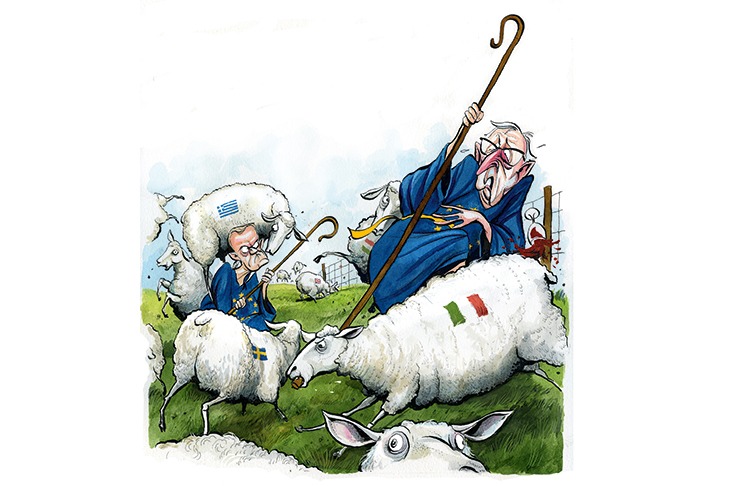This week the EU revealed its true nature. Rather than hand power to a Eurosceptic, the Italian President Sergio Mattarella defied the democratic process, and the wishes of most Italians, and put a puppet in place. Once again a major European democracy has seen the results of a legitimate vote dismissed; swept aside because the EU can’t countenance dissent. It’s hard not to conclude that those who voted Leave in our own referendum so as to ‘take back control’ had a point. The governing elite in Europe simply can’t afford to relinquish control. They can’t let real people have a real say in who leads them because the grand EU project matters above all.
In Italy, in March, the people went to the polls and were deemed to have returned the wrong verdict. Since then the main winners have been trying to put together a governing coalition. As they come from unfathomably different political directions this was always going to be a challenge. And yet last week Five Star and the League managed to agree on some framework priorities for a coalition government.
All seemed to be going swimmingly by Italy’s political standards. The parties even agreed on an unknown academic called Giuseppe Conte (lets call him ‘Professor A’) becoming the new Prime Minister.
Yet although Mattarella (who has the right to approve the government) seemed content with someone who has no experience of politics becoming Prime Minister, he drew the line at the coalition’s proposal for Italy’s new finance minister for the simple reason that he had not, in the past, shown enough support for the EU and the eurozone. Worse, 81-year-old professor Paolo Savona (let’s call him Professor B’) had expressed concerns about the whole project of monetary union, even floating the idea that at some stage Italy (where unemployment now blights the lives of a third of young people) might need to find a means of exiting the currency. President Mattarella could not permit such a heretic at the heart of government and refused to bless the appointment of the finance minister. So it was that Professor B brought down Professor A because of Professor B’s support for Plan B, sending both professors back to their classrooms and ending one of the more easily understood episodes in contemporary Italian politics. In the last few days there have been calls for Mattarella to be impeached — but he had no choice. The EU required compliance.
By way of a coda President Mattarella made a last-ditch attempt to appoint somebody as Prime Minister who at least fulfilled the minimal criterion of being unelected. The President’s only problem was that his proposed Prime Minister — Carlo Cottarelli — is not unknown. ‘Mr Scissors’, as he is known in Italy, was also the candidate of the IMF and reviled for his loyalty to the EU and its advocacy of ‘austerity’ economics. Neither Five Star nor the League are willing to approve this appointment, and so at some point soon the Italian public must return to the polls in order to engage once again in the charade of voting in order to appoint a charade of a government.
Of course, as so often, Brussels had its own clear views on this mess. Most especially on the ill-disciplined, unreformable Italian electorate. The EU Budget Commissioner Günther Oettinger swiftly gave an interview in which he said: ‘My concern and expectation is that the coming weeks will show that developments in Italy’s markets, bonds and economy will become so far-reaching that it might become a signal to voters after all to not vote for populists on the right and left.’ Many Italian voters, as well as fans of mafia bluster, might be familiar with this type of talk. ‘Awfully nice country you’ve got there. Shame if anything happened to it.’
Perhaps recognising that this didn’t quite hit the right note for a democratic project, Günther was swiftly corrected by Donald Tusk (the President of the European Council) who tweeted out the reminder: ‘To all EU institutions: please respect the voters. We are there to serve them, not to lecture them.’ A comment that drew a swift retraction from Günther’s office, and admiration from connoisseurs of chutzpah from Athens to London.
The EU was meant to be a unifying force. Yet look what is happening now. The German papers denounce the Italians as lazy spendthrifts. The Italians accuse the Germans of using the euro to achieve what the Nazis couldn’t. The French condescend to the eastern Europeans, treating them as scabs undercutting wages. The eastern Europeans feel they are being treated like second-class citizens. And the EU’s songs about openness and transparency now sound slightly off-key.
In election after election over recent years the European publics have heard a similar response whenever the people have come back with the ‘wrong’ result. On these terms the Brexit vote was self-evidently wrong. The crippling of Angela Merkel in the recent German elections was clearly wrong. The election of a hard-right coalition in Austria even more wrong. Whereas the Dutch electorate apparently got it ‘right’ in reappointing Mr Rutte. And of course the French electorate got it the most right of all by appointing a man who had no existing party and who broke the political paradigm solely on the strength of his own personality. And since Mr Macron is an advocate of further EU integration he cannot under any circumstances be described as a ‘populist’.
‘Populist’ is one of those terms in the new European playbook reserved only for those (like the would-have-been government of Italy) who are allegedly walking the ‘wrong way’ in this great march. The sort of people who mislead the public with slogans. Unlike ‘En Marche!’, for instance. They are also the type of people who ‘simplify’ matters — presenting complex matters in a simple manner, as opposed to true democrats who lay out every matter to a level of such complexity that only those with a diploma in Austrian economics can be deemed to exercise the franchise responsibly.
And it isn’t just in the south that the voters keep showing themselves in their true, irresponsible lights. In central and eastern Europe people are also consistently voting for the wrong parties. Faced with half a million people walking across their country in 2015, the Hungarian government failed to take a sufficiently multicultural approach to the whole matter. As a result — like the governments in Poland, the Czech Republic and Slovakia — they are regarded by Brussels and Berlin as countries that are going in a fundamentally wrong direction. Since there is no compelling evidence of vote-rigging (not that this has stopped people making such accusations during recent times) their voters are alleged to have been led astray. Their governments are accused of having dealings with their neighbour, or near-neighbour, Russia. And when a leader like Hungary’s President Orbán declares that his country is a ‘Christian democracy’, Brussels and Berlin, like the BBC, react as though he has gone full fascist. At every juncture they declare the illegitimacy of these governments and berate them as though they were vassals, rather than partners.
Central and eastern Europe provide especially striking examples. In April the Hungarian public voted Viktor Orbán into office for a third consecutive term. The EU could have responded by wondering whether Orbán may conceivably be right in some ways. Or have any points of merit? After all, it is in Berlin today, not Budapest, that Jews are now told to be careful about appearing in public with Jewish symbols. But self-reflection never happens. Instead, the people who vote the wrong way are subjected to the new playbook of accusations, including (though not limited to) ‘Russia, populist, nationalist, racist, Cambridge Analytica’.
As of this month the EU is in the process of losing one of its largest contributing members (the UK), has alienated most of central and eastern Europe (notably the Visegrad group), and faces a sullen set of Mediterranean countries. All with the possibility that Italian voters might return to the polls in a few months’ time to issue an even louder ‘screw you’ than they did in March.
Most pragmatic institutions might learn lessons from all this. A couple of weeks ago when President Macron received the somewhat hubristic ‘Charlemagne Prize’ he warned that Brexit, like elections in Italy, Poland and Hungary should be seen as an ‘alarm bell’. And yet there is no evidence that anyone in charge in Brussels, Berlin or Paris wanted to listen. Any more than anyone at the Commission has paid any political price for losing Britain from the EU on their watch. Instead there is only ever the cry of onwards, forwards, faster, towards more integration. No consideration, ever, of a hesitation or pause even to allow the public to catch up.
Of course, Britain is able to compete with the world’s best these days in the sport of foot-shooting. And those bond markets that Günther Oettinger is so exercised about will be just as bullish about a Britain that exits the EU and votes in Jeremy Corbyn as they would be with the Mediterranean countries struggling to determine whether they are law takers (like the Greeks) or still allowed to be law makers (as the Italians may be struggling to be).
Outside the House of Lords Britain still retains a generalised prejudice that the public should be listened to. Across our continent — in the name of greater harmony — another view is emerging. It is one that sounds ever more like the automated messages which customer-service departments imagine to be placating. ‘Please hold the line. Your call is important to us.’
‘Your vote is important to us’, voters in Italy and Europe are politely informed, on a loop, by the dead-voiced machine. ‘Please hold the line.’
Perhaps they will. Perhaps they won’t.


















